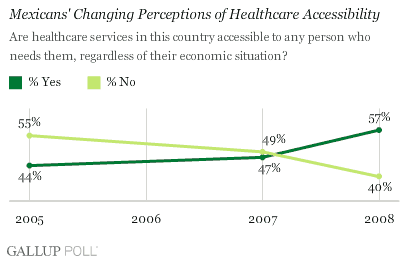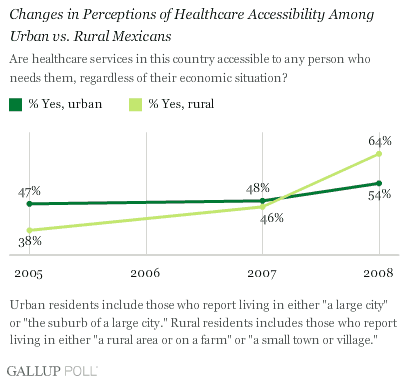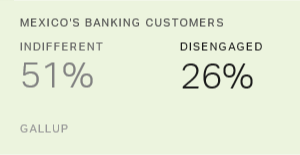WASHINGTON, D.C. -- With swine flu creating a public health emergency in Mexico, Gallup reveals that Mexicans' attitudes toward accessible healthcare services improved in the past few years. Fifty-seven percent of residents in 2008 said healthcare services in their country are accessible to any person who needs them, regardless of their economic situation -- up from 44% in 2005.

Gallup also surveyed respondents in Mexico on their confidence in their national healthcare or medical systems. Seventy-four percent in 2008 said they had confidence -- up from 65% in 2007 and 63% in 2005. The 2008 percentage is well above the 2008 world median of 59%. However, observers so far give Mexican healthcare officials mixed reviews on their response to the outbreak.
While Mexican officials are unsure of the flu's initial source, focus has centered on a pig farm in eastern Veracruz. With cases spreading through the country, the government has shut down schools, universities, museums, and theaters in Mexico City.
Among rural Mexican respondents, positive perceptions about access to healthcare jumped substantially between 2005 and 2008. Gallup last polled in Mexico in August 2008 and found 64% of rural respondents said any person has access to healthcare services -- up from 38% in November 2005. Urban residents showed a much smaller increase, from 47% in 2005 to 54% in 2008.

Mexico instituted a universal healthcare system in 2003 designed specifically to target low-income citizens. Gallup finds that, looking at aggregated data between 2005 and 2008, 37% of rural respondents fell in the lowest income quintile, compared with only 15% of urban respondents. The new system aims to increase healthcare access to 50 million people by 2010. Among respondents in the lowest income quintile, Gallup finds that in 2008, 59% said healthcare services are available to any person, up from 37% in 2005.
While possible cases of swine flu have been reported in numerous countries in the Americas, the World Health Organization has only confirmed cases in Canada, Costa Rica, Mexico, Peru, and the United States. In 2008, the percentage of Mexicans who said care was accessible to any person was higher than in Peru (where 43% said any person has access), but lower than attitudes in Costa Rica (72%). Mexico's ongoing response to the outbreak may positively or negatively affect its citizens' improved attitudes toward the true accessibility of health services for all those affected.
Survey Methods
Results are based on face-to-face interviews with approximately 999 adults, aged 15 and older, conducted between November 2005 and August 2008 in Mexico. For results based on the total sample of national adults, one can say with 95% confidence that the maximum margin of sampling error ranges between ±3.6 and ±3.8 percentage points.
Results are based on face-to-face interviews with approximately 1,000 adults, aged 15 and older, conducted in 2008 in Costa Rica and Peru. For results based on the total sample of national adults, one can say with 95% confidence that the maximum margin of sampling error ranges between ±3.4 and ±3.6 percentage points.
In addition to sampling error, question wording and practical difficulties in conducting surveys can introduce error or bias into the findings of public opinion polls.
